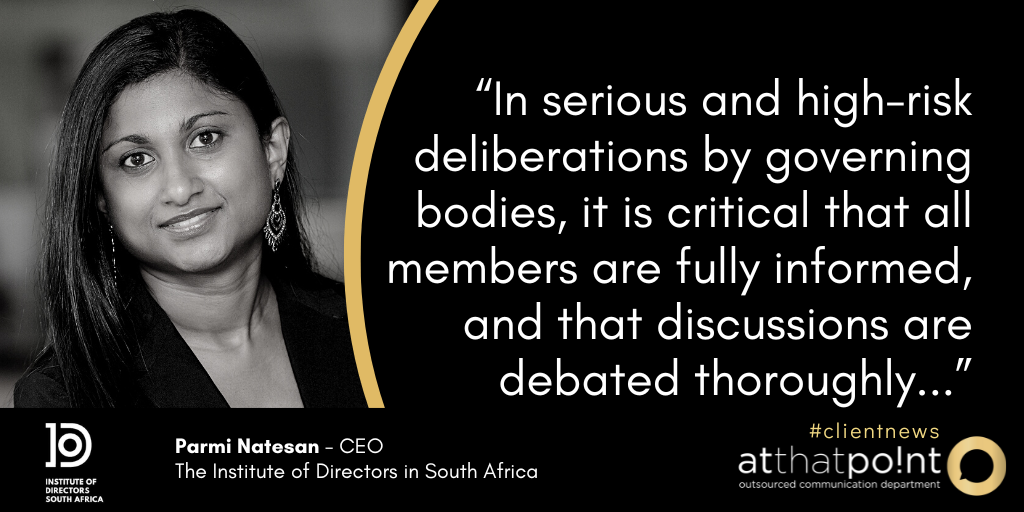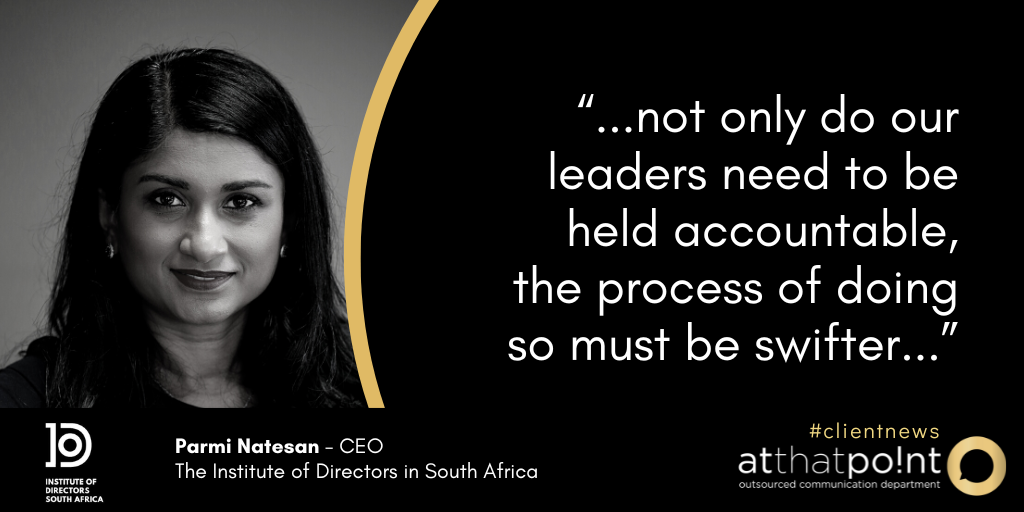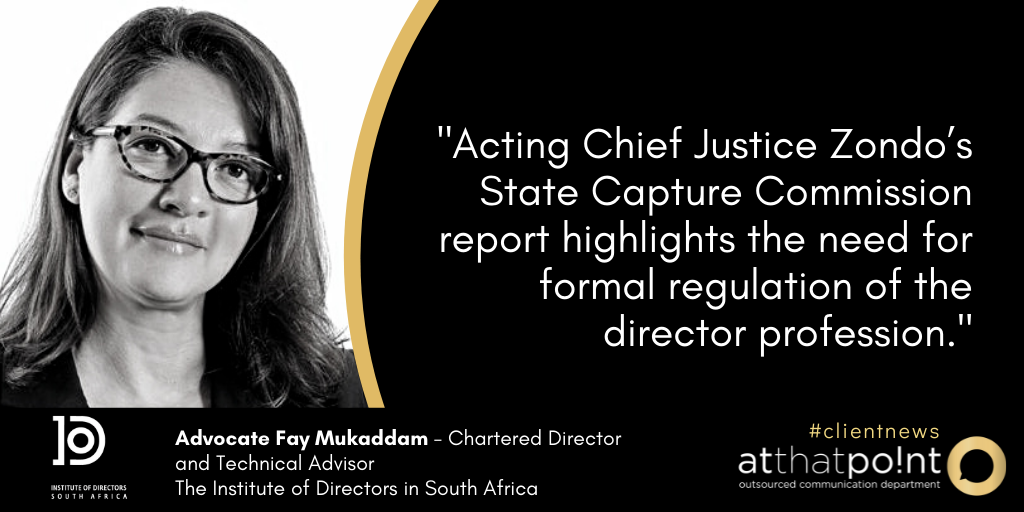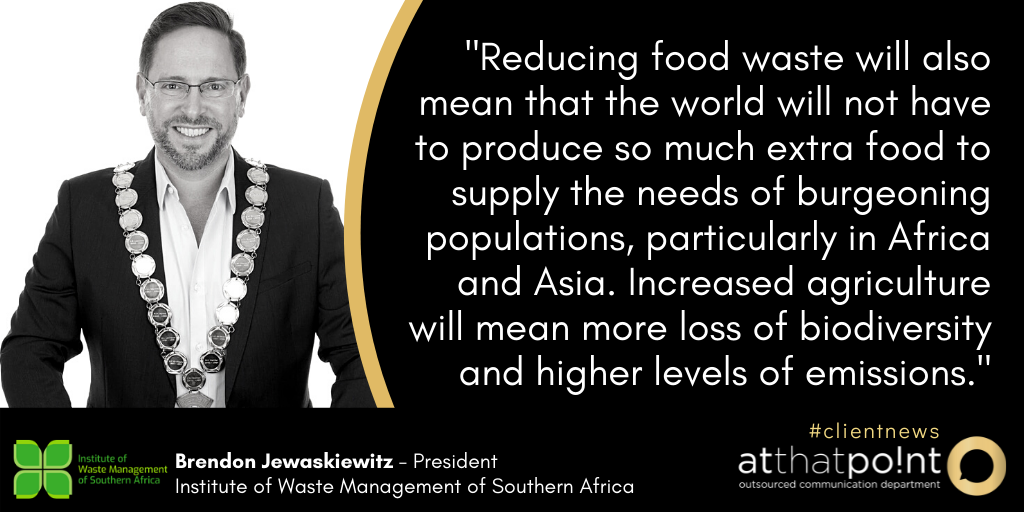UCT Council reports demonstrate the importance of following good governance practices—IoDSA11/10/2022  Reports of the unfolding developments at the University of Cape Town suggest deviations from governance best practice, says the Institute of Directors in South Africa (IoDSA). These include that the UCT Council “was split down the middle about the need for an independent judicial commission of enquiry into allegations of mismanagement and poor corporate governance”,[1] and that potentially implicated members of the Council were allowed to cast a vote in the matter. A key principle of good governance is that individuals on governing bodies need to be aware of conflicts of interest, and declare them upfront. Conflicted governing-body members should then recuse themselves from any business or decisions that relate to their conflict. King IV makes this very clear. Principle 1 of King IV is that “The governing body should lead ethically and effectively”, with Recommended Practice 1 (a)(ii) reading: “Members of the governing body should avoid conflicts of interest. In cases where a conflict cannot be avoided, it should be disclosed to the governing body in full at the earliest opportunity, and then proactively managed as determined by the governing body and subject to legal provisions.” An IoDSA guidance note goes on to advise that “A key function of a chair is to manage conflicts of interest. It is not sufficient merely to table a register of interests. All internal and external legal requirements must be met. The chair must ask affected directors to recuse themselves from discussions and decisions in which they have a conflict unless they are requested to provide specific input, in which event they should not be party to the decision.” In this instance, if the reports of potentially implicated Council members being allowed to vote on a matter that concerned them intimately are true, this would constitute a departure from governance best practice. Certainly, a large section of the Council seems to believe that such an unethical decision was taken, and has gone public with its disagreement. This in turn is attracting unfavourable media attention, and may imperil the ability of the governing body to function effectively in the future. Whatever the rights and wrongs, the very existence of such a profound split in a governing body on such an important matter is also a concern. “In serious and high-risk deliberations by governing bodies, it is critical that all members are fully informed, and that discussions are debated thoroughly and ultimately culminate in a decision that has the backing of the entirety, or at least the vast majority, of the governing body which is collectively responsible,” concludes Ms Natesan. [1] Andriaan Basson and Marvin Charles, “UCT crisis deepens as 13 top council members slam ‘irregular, flawed’ meeting”, News 24 (7 October 2022), available at https://www.news24.com/news24/southafrica/news/breaking-uct-crisis-deepens-as-13-top-council-members-slam-irregular-flawed-meeting-20221007. ENDS MEDIA CONTACT: Stephné du Toit, [email protected], 084 587 9933, www.atthatpoint.co.za For more information on the IoDSA please visit: Website: www.iodsa.co.za Twitter: @The_IoDSA LinkedIn: Institute of Directors South Africa Company Page Facebook: Institute of Directors South Afric
0 Comments
 In its final report, the Zondo Commission repeatedly comments that directors of the various captured state entities have not been properly held accountable for the massive damage they have caused to the organisations they were supposed to serve, and thus indirectly to the country as a whole. The Institute of Directors in South Africa (IoDSA) strongly endorses these observations. “The issue of director accountability is one that the IoDSA has been raising in public forums for a number of years. In a letter to the Commission in September 2021, we specifically raised the point that not only do our leaders need to be held accountable, the process of doing so must be swifter,” says Parmi Natesan, CEO, IoDSA. “We recommended the establishment of a constitutional means of alternate dispute resolution to facilitate prompt and effective consequence management both for transgressing directors and those charged with exercising oversight over them.” In its final report, the Zondo Commission maintains that legal processes typically only manage to identify “egregious abuses of public power” when the perpetrators or those that protect them are out of power. The Report also makes the point that the delayed legal process is a “cumbersome, time consuming [sic] exercise”. It therefore recommends that the Companies Act’s 24-month time bar relating to delinquency directors should be extended. This would allow prosecution of, amongst others, the 2014 board of Eskom and two erring South African Airways directors.[1] One of those two directors, Dudu Myeni, the former chair of South African Airways, was declared a delinquent director in 2020 but, says Ms Natesan, only after an extremely time- and resource-intensive process. As a result, director accountability remains rare. The Report then makes a more sweeping recommendation that Government “give consideration to the creation of a statutory offence rendering it a criminal offence for any person vested with public power to abuse public power vested in that person by intentionally using that power otherwise than in good faith for a proper purpose” [emphasis in original].[2] “The IoDSA certainly supports the idea that the 24-month time bar should be extended to allow for holding the numerous defaulting directors identified in the Report to be investigated and prosecuted if necessary. Furthermore, we strongly believe that a more streamlined and rapid process needs to be found,” Ms Natesan says. “An excellent short cut would be to mandate that all directors have to belong to the professional body for directors, so that they could be disciplined under a Code of Conduct and barred from serving as directors if they are found to be in breach of their duties, without the long delays inherent in the legal process. “The benefit would be that the transgressing director would not remain in office while the legal process takes its course—something that would surely have contained the damage caused to SOEs like Eskom and SAA.” ENDS MEDIA CONTACT: Stephné du Toit, [email protected], 084 587 9933, www.atthatpoint.co.za For more information on the IoDSA please visit: Website: www.iodsa.co.za Twitter: @The_IoDSA LinkedIn: Institute of Directors in South Africa Company Page Facebook: Institute of Directors South Africa [1] Judicial Commission of Inquiry into Allegations of Capture, Corruption and Fraud in the Public Sector Including Organs of State, Report: Part VI, Volume 4: Summary of Recommendations 37 (p 95), 12 -3(p 3) and 119 (p 43), available at www.statecapture.org.za/site/files/announcements/672/OCR_version_-_State_Capture_Commission_Report_Part_VI_Vol_IV_-_Recommendations.pdf. [2] Ibid 119 (p 43), 122-6 (p44).  “Acting Chief Justice Zondo’s State Capture Commission report highlights the need for formal regulation of the director profession,” says Advocate Fay Mukaddam, Chartered Director (SA) and Governance Specialist at the Institute of Directors South Africa (IoDSA). As examples, Mukaddam points to the first volume’s allegations of gross mismanagement at SAA and its chairperson at the time eventually being declared a delinquent director by the courts. “While legal action can be taken to prohibit an incompetent or criminal director from serving on any boards in the future, this is effectively closing the stable door after the horse has bolted,” she says, insisting that early prevention is better than eventual punishment. A flawed system What stands out in the report is cadre deployment that saw people appointed to boards in SOEs and public sector entities because of their political connections rather than their fitness as directors. It is evident that they often did not understand or respect their mandate and either neglected or ignored their obligation to the organisation and the law. As a result, they allowed poor performance to infect the corporate culture they were meant to heal and led their organisation to ruin. This signals a flawed recruitment, screening, selection and appointment process and a lack of appreciation for what the roles and responsibilities of a director and board are. "If one doesn't understand what they are elected to do, how can they acquit themselves of their fiduciary duties?" asks Mukaddam. It also appears that, due to their questionable appointment, they were not subjected to the same performance interventions or rehabilitation processes as everyone else. The impact of poor directors SAA is a prime example of what happens when even a few poor directors are appointed to boards. Unfortunately, director acumen and commitment to their duties vary widely across organisations in both the public and private sectors, and low performance can go unnoticed until it is too late. “Professional directors as a collective have a significant impact on the economy, yet almost anyone can become a director without possessing the level of competency essential to their office,” says Mukaddam. The vetting process is largely left to the incumbent board or the vote of the organisation’s shareholders. Mukaddam suggests that this process is unsustainable, especially in developing countries like South Africa where robust policy is critical to economic recovery. A better approach “It is long past due that an independent regulator is empowered to accredit incoming directors against global professional standards, hold them accountable for misconduct, and formalise their continuous professional development on pain of being disqualified,” states Mukaddam. Other significant professionals, like doctors, auditors or attorneys, are required to pass a bar exam or professional evaluation before being allowed to practice. They are also subject to the disciplinary oversight of their professional body and must commit themselves to monitored lifelong learning. Yet none hold more sway over their nation’s prosperity than public and private professional directors. “A regulator, supported by government and the private sector, is far more effective than a long and difficult legal battle for a delinquency judgement after an organisation is already crippled,” says Mukaddam. ENDS MEDIA CONTACT: Idéle Prinsloo, 082 573 9219, [email protected], www.atthatpoint.co.za For more information on the IoDSA please visit: Website: www.iodsa.co.za Twitter: @The_IoDSA LinkedIn: Institute of Directors South Africa Company Page Facebook: Institute of Directors South Africa  Johannesburg - A strong unequivocal commitment to fiscal sustainability announced by the Finance Minister in his Medium-Term Budget statement is to be welcomed, but the decisive test is always seeing words put into action and for government not to waver from its stated path. The Institute of Directors South Africa (IoDSA) says boardrooms around the country should welcome Minister Enoch Godongwana’s sentiments on long-term growth, narrowing the budget deficit and stabilising the worrying trend of rising debt. Notes IoDSA, CEO Parmi Natesan, “In order for business to thrive in South Africa and confidence to increase, strong messages like this assist and go a long way to restoring confidence. However, promises without swift action are hollow and we now look forward to seeing how government plans to deal with the debt issue that remains at worryingly elevated levels. We are also buoyed by the Minister’s concerns over unemployment but again we need to see more detail on the solve.” Natesan says a call for faster implementation of structural reforms to unlock greater private sector investment, economic growth and job creation is also a welcome move, particularly when it comes to private sector participation. “Our members tell us their companies are prepared to act and participate more robustly if over-regulation and red tape are reduced which would then create a smoother and more efficient operating environment.” Natesan says a critical aspect of big infrastructure spend is fiscal accountability. “Big capital projects always carry high potential for fraud and malfeasance. Now more than ever we need the right governance protocols in place and then implemented without fear or favour to make sure allocated funding is responsibly managed and accounted for.” ENDS MEDIA CONTACT: Idéle Prinsloo, 082 573 9219, [email protected], www.atthatpoint.co.za For more information on the IoDSA please visit: Website: www.iodsa.co.za Twitter: @The_IoDSA LinkedIn: Institute of Directors in South Africa Company Page  Recent events in both the public and private sectors are again highlighting the key role that proper succession planning plays in supporting any organisation’s sustainability, particularly when it comes to CEOs and governing-body chairs. Poor succession planning inevitably creates a leadership vacuum at both governing body and executive management level resulting in a loss of the longer term strategic focus. The impacts of this uncertainty can be dire, says Richard Foster, facilitator at the Institute of Directors in Southern Africa (IoDSA). Impacts can include a loss of performance delivery influenced by such factors as possible churn at the senior management level, the loss of market share to more focused competitors, severe reputational damage and erosion of investor and other key stakeholder confidence in both the governing body and senior management alike. “Because good governance relies on effective leadership, succession planning receives significant focus in King IV. In addition, its five sector supplements deal with the specific issues relating to succession planning in different contexts,” Mr Foster notes. The position is particularly complex when it comes to state-owned entities (SOEs) because certain appointments like the CEO and governing-body chair are typically mandated in legislation or founding documents. The shareholder thus plays a key role, and the process is not as easily aligned with what is considered governance best practice, he says. A similar situation exists in local government. One mark of the difficulties of proper succession planning at SOEs is the reliance on interim appointments. However, they inevitably create uncertainty unless they are well thought-through and the process is properly communicated to stakeholders. “One of the governing body’s primary functions is to create and oversee the implementation of strategy, implying a three-to-five-year, or even longer timeline. Interim appointments, by contrast, tend to be operationally focused pending a permanent appointment,” he says. King IV recommends that governing bodies should ensure succession plans exist for their own members, as well as for the CEO and executive management team. However, because succession planning is intimately connected with the appointment of these senior office-bearers, succession planning for SOEs is, as previously mentioned, more complex and challenging. Typically, the shareholder/executive authority (ultimately the government) has the power (or obligation) to appoint the chair and/or the CEO and/or other governing-body members. In its SOE Sector Supplement, King IV recommends that these appointments should be accomplished via a robust and transparent process that involves the governing body (the accounting authority) as much as possible to give effect to the aspirations of the relevant principle. “The processes for appointing CEOs or chairs at certain SOEs is sometimes questioned. The damage caused by unsuitable appointments is now plain, and both the organisations and the economy as a whole are affected,” he says. To align succession planning in SOEs better with governance best practice, the King IV SOE Sector Supplement recommends that the CEO’s letter of appointment should clearly state that the CEO is accountable to the governing body (rather than the executive authority i.e. shareholder), that the governing body and CEO jointly agree on how the CEO’s performance should be measured, and that the governing body has the primary responsibility for firing the CEO. “It is encouraging that Government seems to have now recognised that good corporate governance requires ethical and effective leadership, and that increased focus appears to have been placed on the succession planning and attendant appointment process,” Mr Foster concludes. “The consequences of not following the recommended practices of good governance are now plain to see.” ENDS MEDIA CONTACT: Idéle Prinsloo, 082 573 9219, [email protected], www.atthatpoint.co.za For more information on the IoDSA please visit: Website: www.iodsa.co.za Twitter: @The_IoDSA LinkedIn: Institute of Directors in Southern Africa Company Page |
Archives
July 2024
Categories
All
|

 RSS Feed
RSS Feed